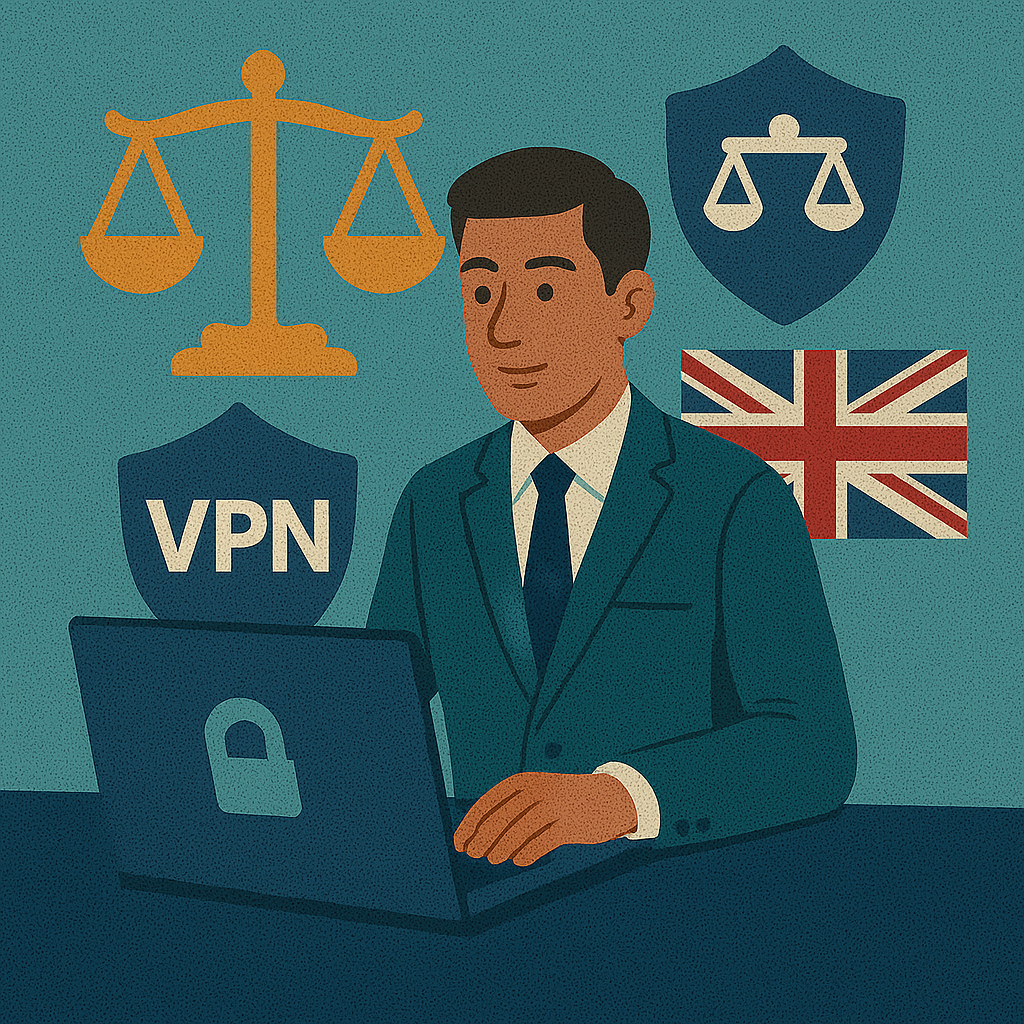Using a VPN (Virtual Private Network) is legal in the United Kingdom. Millions rely on VPNs to protect privacy, secure public Wi-Fi, and work remotely. Key point: a VPN is lawful as a tool; illegal acts remain illegal regardless of whether a VPN is involved.
The UK legal position
There are no UK laws that prohibit owning or using a VPN. Businesses and public bodies widely use VPNs to secure access to internal systems. For personal use, VPNs help reduce tracking and protect data on insecure networks. What remains prohibited are the underlying offences (e.g., fraud, hacking, copyright infringement). A VPN neither legalises nor excuses such behaviour.
EU and allies: the general picture
Across the EU, as well as in countries like the US and Canada, VPNs are generally permitted. Regulation focuses on unlawful conduct (piracy, cybercrime) rather than the technology itself — which is why VPNs are standard in remote work environments.
Countries with restrictions
Some states restrict or license VPN use — typically those practising heavy Internet control. Examples often cited include:
- China — access allowed primarily via government-approved or licensed VPNs;
- Russia — regulatory requirements for providers; many popular VPN endpoints blocked;
- Iran — limits on unlicensed public VPNs; corporate use may be permitted;
- UAE — VPNs are legal, but using them to commit an offence can lead to penalties.
Status can change — always check local rules before travelling.
This information is general and not legal advice. If in doubt, seek local legal counsel.
Streaming platforms and ToS
Using a VPN to access a different streaming catalogue (e.g., Netflix or BBC iPlayer) may breach a platform’s terms of service, even though it isn’t a crime. Providers may block the stream or show an error if they detect VPN IPs. For background on geo-blocking, see VPN & Geo-Blocks.
When a VPN is especially useful
- Public Wi-Fi security — cafés, airports, hotels: encrypt traffic to prevent snooping and credential theft.
- Privacy by design — reduce profiling by advertisers and data brokers.
- Remote work — protect access to company resources with end-to-end encryption.
- Travelling — keep access to home services and accounts with a private, consistent connection.
If you’re new to the tech, start with What Is a VPN? and our guide to Free VPNs.
Lawful and safe use: best practices
- Choose reputable providers with transparent privacy policies and audits — e.g., NordVPN or Surfshark.
- Use modern protocols (WireGuard/NordLynx, OpenVPN) and enable the kill switch.
- Respect platform ToS and local laws, particularly when travelling.
- Avoid “free” VPNs that throttle, inject ads, or log activity. See Free VPN — Is It Safe?
Common questions (UK)
Is a VPN itself illegal in the UK?
No. VPNs are lawful tools used by consumers and businesses alike.
Can a VPN hide illegal activity?
No. A VPN encrypts traffic and masks your IP, but it doesn’t legalise wrongdoing.
Will my ISP know I’m using a VPN?
They can usually see that you connect to a VPN server, but not the websites or content you access.
Does a VPN affect online banking?
It typically improves safety on public networks. If your bank flags unusual logins, try a local UK server.
Is bypassing streaming geo-blocks legal?
Using a VPN to access other catalogues can breach platform ToS; it isn’t a criminal offence. Providers may block access until you disconnect.
Bottom line
In 2025, VPNs are legal in the UK and most of the world. A VPN significantly improves privacy and security but does not guarantee complete anonymity. Issues arise if you commit an offence or breach a service’s ToS.
Quick answer
Yes. VPNs are legal in the UK. They’re lawful to use for privacy and security; illegality depends on the underlying act, not the tool. When travelling, always check local rules.
